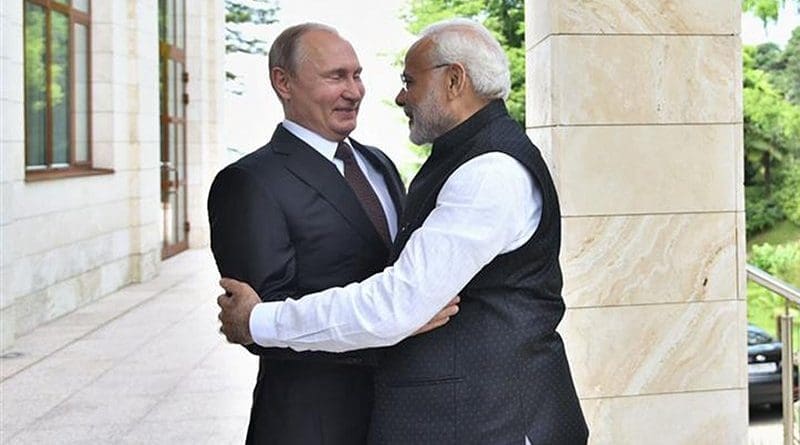India’s Perspective On Russia’s Global And Regional Developments – Analysis
India shares a special and privileged strategic partnership with Russia. It closely monitors the developments of Russia as it has an impact on New Delhi. The year 2018 for India was a mixed bag of opportunities and concerns in relation to Russia’s developments both in global and regional level1. In 2018, Russia witnessed the continuation of the tensed relationship with the West, especially the US. Russian Foreign Minister Sergey Lavorv during an interview said that there Russophobic sentiments amongst the West has reached an unprecedented level. For India, the tensed and strained relationship between Russia and the West is not a positive development as it affects India’s policies.
New Delhi shares a good relationship with both the ex-superpowers and it believes that a conducive and good relationship between Russia and the US is good for the world’s peace, stability and development. India was able to avoid the Countering America’s Adversaries Through Sanctions Act (CAATSA) on signing the S-400 missile defence system deal2 with Russia in October 2018 because of New Delhi’s good relationship with America. But how far the US administration will be fine to waiver it off from India remains to be seen.
India is also worried about the tension that is going between Russia and the US over the bilateral arms treaty. President Donald Trump in October 2018, announced his plans to withdrew US from the Intermediate-Range Nuclear Forces Treaty (INF) with Russia. This announcement not only puts a hold on the future of the 2010 New Strategic Arms Reduction Treaty (New START) but also triggers off to an unprecedented race for nuclear weapons in the world. Russia and US blames each other on violating the treaty and the Anti-Ballistic Missile (ABM) Treaty. It won’t be too farfetched to say that the nullification of these treaties and dialogues might create opportunities to further have a nuclear arms race in the outer space. With unpredictable and brash leaderships that is emerging in the world from all corners, the peace and stability of the world is at stake.
Apart from Russia-US relationship, India closely watches Russia’s relationship with China and Pakistan as well as with the Taliban. There have been quite a lot of developments in these fronts. One of the common factors that bind these three countries including with the Taliban is the fact that they see Islamic State (IS) as the common threat. For India, it does not distinguish between ‘good’ and ‘bad’ terrorists. Till the early months of 2016, Russia too did not differentiate amongst terrorists. But since the Taliban were able to defeat the IS and the affiliated groups in Afghanistan, Moscow has been willing to work with the Taliban to help Afghanistan reach a resolution. Russia has been active in this front and had organized the Moscow Format last year where all the stakeholders, including the Kabul government and the Taliban were also invited. India participated unofficially.
Another fact that is bringing Russia-China-Pakistan close is their stand against the US. The growing deterioration in their bilateral relationship with the US is making things complicated for the international community.
Meanwhile, the Vostok-2018 military exercise which Russia undertook with China and Mongolia was one of the largest. It was a strong message from Russia and China especially to the West, including the US. The interesting part of this exercise was that Russian President Vladimir Putin during the closing ceremony said that to the Russian personnel that this exercise was not only for combat preparedness but also to be ready to protect Russia’s allies in need3. Recently, Russia and China has upgraded their strategic partnership to a comprehensive strategic partnership of coordination for a new era. How it will impact India needs to be observed in the near future.
Bilaterally, President Putin’s re-election in 2018 has been a positive development for India. The two leaders share a strong and close bonhomie that has helped in further enhancing the strategic partnership between the two countries.
During the 19th Annual Summit in 2018, Prime Minister Narendra Modi and President Putin praised the 20 per cent increase in the bilateral trade volume. In 2017, the annual trade volume stood at $10.7 billion. Russia in 2018 introduced the hypersonic weapons which are said to be capable of defending the country. Bilaterally, this can be an area for India-Russia to cooperate in the future. There have been developments in other sectors in the bilateral relationship. In the regional level, the Russia-India-China format in the highest level got active when the three heads of the states met for the second time in 12 year after the formation of the trilateral format. The three leaders are looking forward for the 2019 R-I-C meeting between them.
Meanwhile, Russia wrote off the debt from Kyrgyzstan in 2018. Moscow is trying to stay close to Bishkek for its strategic location. For India, it is a positive development as Central Asia is important for India’s connectivity policy, including for the International North South Transport Corridor (INSTC) and Chabahar Port. Hence, Russia’s development in 2018 was a mixed bag for India that has helped New Delhi to further focus on areas such as defence, economy, energy, etc. to cooperate and rejuvenate the relationship with Russia. India understands the significance of Russia for global and regional peace and stability as well as for New Delhi’s growth and development in this complex world order.
*Dr. Indrani Talukdar is a Research Fellow at ICWA, New Delhi.
Disclaimer: The views are that of the authors and not of the Council
Notes:
- “Press review: Lavrov blasts West’s Russophobia”, TASS, January 22, 2018. http://tass.com/pressreview/986198.
- The signing of the S-400 deal was a strong political message that India conveyed to the world.
- “Vostok-2018 military manoeuvres”, President of Russia, September 13, 2018. http://en.kremlin.ru/events/president/news/58548.

